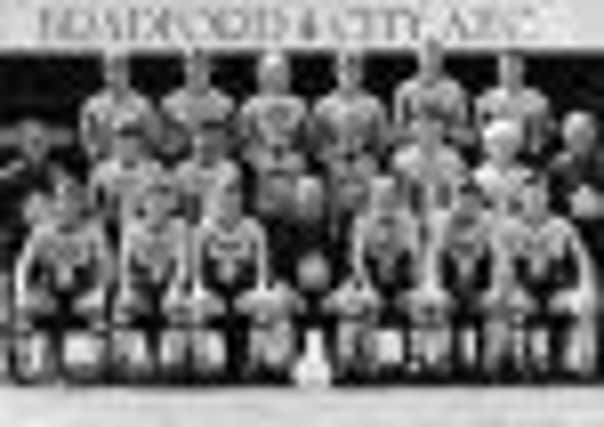Sporting Bygones: League Cup showdown with Aston Villa provides Bantams with ideal chance to improve poor record against Premier League side


There have not been too many meetings between the sides in recent times but those that have occurred, inevitably, have been significant ones.
Of course, there was the four Premier League battles when Bradford enjoyed their brief two-year spell in the top flight between 1999 and 2001.
Advertisement
Hide AdAdvertisement
Hide AdThey have not met since the last – a 3-0 vanquishing at home on February 3 2001 – and, in total, the Bantams only garnered one point from those elite affairs.
However, City had had a huge opportunity to return to the upper echelons of English football long before, only for Villa to somehow thwart their chances.
It was 25 years ago when Terry Dolan’s Bradford thought they were finally going to reach the promised land having, at one stage, been handily placed six points clear at the top of the old Division Two.
They slipped to second but a trip to promotion rivals Villa on the penultimate weekend would prove decisive with the West Yorkshire club still knowing victory would all but cement an automatic spot.
Advertisement
Hide AdAdvertisement
Hide AdThey were confident ahead of the journey on May 2, 1988. Though their hosts were revered as a buccaneering side away from Villa Park – winning 13 and losing just four for the most impressive figures in the division – their home form was lamentable.
Villa, sat in fourth, had an awful record there that season having previously won just eight times before Bradford’s arrival.
You had to trawl down to 17th placed Bournemouth for a club with a worse return on their own patch and it made it all the more remarkable they were even in the promotion reckoning.
As it materialised, this would be a typically fraught affair too played out in front of a massive crowd of 36,423.
Advertisement
Hide AdAdvertisement
Hide AdIn a game of few chances, City had the first clear opportunity when John Hendrie latched on to Ian Ormondroyd’s header and neatly spun on the six-yard box only to fire over the bar.
Villa, with future England manager Graham Taylor in his first season in charge, soon had efforts of their own, though, and Bradford were reliant on Warren Aspinall’s profligacy to remain in the contest.
Firstly, he lapped up Gavin Oliver’s ill-conceived back-pass to push straight through on the City goal only to fire wide.
Soon after, the influential Kevin Gage supplied him with another clear-cut chance down the middle but Aspinall this time blazed his shot over the bar.
Advertisement
Hide AdAdvertisement
Hide AdCity, who were unbeaten in 10 games, struggled for any of their usual fluency and it was no great surprise when a prodigious youngster with a fast-growing reputation put their opponents ahead in the 36th minute.
David Platt had joined Manchester United from school only to be released in 1985 after a series of cost-cutting measures without having ever played a game at Old Trafford.
The attacking midfielder, instead, continued his development at Crewe Alexandra in the fourth division and progressed so swiftly that Taylor forked out £200,000 on him early in 1988 as he looked to bolster his squad’s hopes of promotion.
Platt, indeed, gave Villa that requisite push, scoring on his debut against fellow high-fliers Blackburn Rovers and, now, coming up with the vital winner versus Bradford.
Advertisement
Hide AdAdvertisement
Hide AdGage was again the creator, whipping in a cross from the right which Platt headed in with real force, arriving from deep with the sort of finish he would become renowned for.
He became a prolific force at Villa, eventually commanding a club record £5.5m fee when he was sold to Italian side Bari in 1991, chiefly following his exploits in the World Cup with England the previous year.
Bradford, meanwhile, never recovered and despite the efforts of players like captain Stuart McCall and leading scorer Ron Futcher, suffered a heart-breaking 1-0 defeat.
Worse was to follow. Dolan’s men knew their destiny was still in their own hands when they faced Ipswich Town at Valley Parade on the final day.
Advertisement
Hide AdAdvertisement
Hide AdYet without the attacking prowess of Hendrie – who had never missed a league game for the Bantams, playing 173 consecutive matches until a red card against Manchester City saw him suspended here – they endured an agonising 3-2 home defeat.
The Bantams inconceivably finished in fourth, one point below Villa who clung on to a nailbiting goalless draw at Swindon Town to earn promotion courtesy of a superior goal difference to third-placed Middlesbrough.
Millwall had been promoted as champions on May 2, gaining First Division status for the first time in their history having timed their run to perfection with seven successive wins. City should still have felt positive about facing Boro in the play-offs having already beaten them twice that campaign but they squandered that chance too, eventually losing over two legs having faced extra-time, and it would be another 11 long years before they finally played in the top tier again for the first time since 1922.